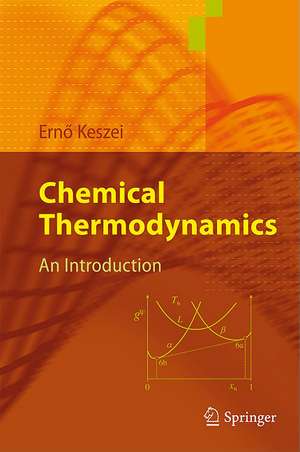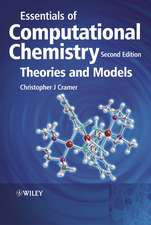Chemical Thermodynamics: An Introduction
Autor Ernö Keszeien Limba Engleză Paperback – 14 oct 2011
Structured around several features to assist students’ understanding, Chemical Thermodynamics :
- Develops applications and methods for the ready treatment of equilibria on a sound quantitative basis.
- Requires minimal background in calculus to understand the text and presents formal derivations to the student in a detailed but understandable way.
- Offers end-of-chapter problems (and answers) for self-testing and review and reinforcement, of use for self- or group study.
Preț: 463.79 lei
Nou
Puncte Express: 696
Preț estimativ în valută:
88.75€ • 93.32$ • 73.33£
88.75€ • 93.32$ • 73.33£
Carte disponibilă
Livrare economică 27 martie-10 aprilie
Preluare comenzi: 021 569.72.76
Specificații
ISBN-13: 9783642198632
ISBN-10: 3642198635
Pagini: 328
Ilustrații: XI, 354 p. 77 illus., 6 illus. in color.
Dimensiuni: 155 x 235 x 16 mm
Greutate: 0.64 kg
Ediția:2012
Editura: Springer Berlin, Heidelberg
Colecția Springer
Locul publicării:Berlin, Heidelberg, Germany
ISBN-10: 3642198635
Pagini: 328
Ilustrații: XI, 354 p. 77 illus., 6 illus. in color.
Dimensiuni: 155 x 235 x 16 mm
Greutate: 0.64 kg
Ediția:2012
Editura: Springer Berlin, Heidelberg
Colecția Springer
Locul publicării:Berlin, Heidelberg, Germany
Public țintă
Upper undergraduateCuprins
1: Postulates of thermodynamics.- 2: Thermodynamic equilibrium in isolated and isentropic systems.- 3: Thermodynamic equilibrium in systems with other constraints.- 4: Thermodynamic processes and engines.- 5: Thermodynamics of mixtures (multi-component systems).- 6: Phase equilibria.- 7: Equilibria of chemical reactions.- 8: Extension of thermodynamics for additional interactions (non-simple systems).- 9: Elements of equilibrium statistical thermodynamics.- 10: Transport processes.
Recenzii
From the reviews:
“This book is intended primarily as a text for undergraduate students in physical chemistry. … The author briefly describes the basics and attempts to provide students who have minimal calculus skills with an understanding of the subject. … Overall, the presentation is fairly straightforward and clearly written. … Summing Up: Recommended. Lower- and upper-division undergraduates.” (R. Darby, Choice, Vol. 50 (4), December, 2012)
“This book is intended primarily as a text for undergraduate students in physical chemistry. … The author briefly describes the basics and attempts to provide students who have minimal calculus skills with an understanding of the subject. … Overall, the presentation is fairly straightforward and clearly written. … Summing Up: Recommended. Lower- and upper-division undergraduates.” (R. Darby, Choice, Vol. 50 (4), December, 2012)
Notă biografică
Ernö Keszei is professor of physical chemistry at the Eötvös University in Budapest, Hungary. He received his Ph.D. in physical chemistry also in Budapest in 1978 and has worked on numerous research projects and also as a visiting scientist in Canada and Moscow. In addition to his active research, Ernö Keszei has been teaching undergraduates physical chemistry since 1975.
He is the author of over 60 papers in scientific journals and has major contributions in three books. Chemical Thermodynamics: An Introduction is based on his lectures held since 1991.
He is the author of over 60 papers in scientific journals and has major contributions in three books. Chemical Thermodynamics: An Introduction is based on his lectures held since 1991.
Textul de pe ultima copertă
This course-derived undergraduate textbook provides a concise explanation of the key concepts and calculations of chemical thermodynamics. Instead of the usual ‘classical’ introduction, this text adopts a straightforward postulatory approach that introduces thermodynamic potentials such as entropy and energy more directly and transparently.
Structured around several features to assist students’ understanding, Chemical Thermodynamics :
- Develops applications and methods for the ready treatment of equilibria on a sound quantitative basis.
- Requires minimal background in calculus to understand the text and presents formal derivations to the student in a detailed but understandable way.
- Offers end-of-chapter problems (and answers) for self-testing and review and reinforcement, of use for self- or group study.
This book is suitable as essential reading for courses in a bachelor and master chemistry program and is also valuable as a reference or textbook for students of physics, biochemistry and materials science.
Structured around several features to assist students’ understanding, Chemical Thermodynamics :
- Develops applications and methods for the ready treatment of equilibria on a sound quantitative basis.
- Requires minimal background in calculus to understand the text and presents formal derivations to the student in a detailed but understandable way.
- Offers end-of-chapter problems (and answers) for self-testing and review and reinforcement, of use for self- or group study.
This book is suitable as essential reading for courses in a bachelor and master chemistry program and is also valuable as a reference or textbook for students of physics, biochemistry and materials science.
Caracteristici
Eminently suitable as a required textbook comprising complete material for or an undergraduate chemistry major course in chemical thermodynamics Clearly explains details of formal derivations that students can easily follow and so master applied mathematical operations Offers problems and solutions at the end of each chapter for self-test and self- or group study Includes supplementary material: sn.pub/extras











